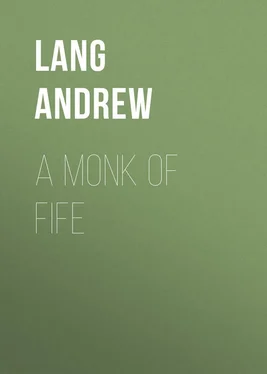Andrew Lang - A Monk of Fife
Здесь есть возможность читать онлайн «Andrew Lang - A Monk of Fife» — ознакомительный отрывок электронной книги совершенно бесплатно, а после прочтения отрывка купить полную версию. В некоторых случаях можно слушать аудио, скачать через торрент в формате fb2 и присутствует краткое содержание. Жанр: foreign_antique, foreign_prose, на английском языке. Описание произведения, (предисловие) а так же отзывы посетителей доступны на портале библиотеки ЛибКат.
- Название:A Monk of Fife
- Автор:
- Жанр:
- Год:неизвестен
- ISBN:нет данных
- Рейтинг книги:3 / 5. Голосов: 1
-
Избранное:Добавить в избранное
- Отзывы:
-
Ваша оценка:
- 60
- 1
- 2
- 3
- 4
- 5
A Monk of Fife: краткое содержание, описание и аннотация
Предлагаем к чтению аннотацию, описание, краткое содержание или предисловие (зависит от того, что написал сам автор книги «A Monk of Fife»). Если вы не нашли необходимую информацию о книге — напишите в комментариях, мы постараемся отыскать её.
A Monk of Fife — читать онлайн ознакомительный отрывок
Ниже представлен текст книги, разбитый по страницам. Система сохранения места последней прочитанной страницы, позволяет с удобством читать онлайн бесплатно книгу «A Monk of Fife», без необходимости каждый раз заново искать на чём Вы остановились. Поставьте закладку, и сможете в любой момент перейти на страницу, на которой закончили чтение.
Интервал:
Закладка:
Andrew Lang
A Monk of Fife Being the Chronicle Written by Norman Leslie of Pitcullo, Concerning Marvellous Deeds That Befell in the Realm of France, in the Years of Our Redemption, MCCCCXXIX-XXXI
PREFACE
Norman Leslie of Pitcullo, whose narrative the reader has in his hands, refers more than once to his unfinished Latin Chronicle. That work, usually known as “The Book of Pluscarden,” has been edited by Mr. Felix Skene, in the series of “Historians of Scotland” (vol. vii.). To Mr. Skene’s introduction and notes the curious are referred. Here it may suffice to say that the original MS. of the Latin Chronicle is lost; that of six known manuscript copies none is older than 1480; that two of these copies contain a Prologue; and that the Prologue tells us all that has hitherto been known about the author.
The date of the lost Latin original is 1461, as the author himself avers. He also, in his Prologue, states the purpose of his work. At the bidding of an unnamed Abbot of Dunfermline, who must have been Richard Bothwell, he is to abbreviate “The Great Chronicle,” and “bring it up to date,” as we now say. He is to recount the events of his own time, “with certain other miraculous deeds, which I who write have had cognisance of, seen, and heard, beyond the bounds of this realm. Also, lastly, concerning a certain marvellous Maiden, who recovered the kingdom of France out of the hands of the tyrant, Henry, King of England. The aforesaid Maiden I saw, was conversant with, and was in her company in her said recovery of France, and till her life’s end I was ever present.” After “I was ever present” the copies add “etc.,” perhaps a sign of omission. The monkish author probably said more about the heroine of his youth, and this the copyists have chosen to leave out.
The author never fulfilled this promise of telling, in Latin, the history of the Maid as her career was seen by a Scottish ally and friend. Nor did he ever explain how a Scot, and a foe of England, succeeded in being present at the Maiden’s martyrdom in Rouen. At least he never fulfilled his promise, as far as any of the six Latin MSS. of his Chronicle are concerned. Every one of these MSS. – doubtless following their incomplete original – breaks off short in the middle of the second sentence of Chapter xxxii. Book xii. Here is the brief fragment which that chapter contains: —
“In those days the Lord stirred up the spirit of a certain marvellous Maiden, born on the borders of France, in the duchy of Lorraine, and the see of Toul, towards the Imperial territories. This Maiden her father and mother employed in tending sheep; daily, too, did she handle the distaff; man’s love she knew not; no sin, as it is said, was found in her, to her innocence the neighbours bore witness.. ”
Here the Latin narrative of the one man who followed Jeanne d’Arc through good and evil to her life’s end breaks off abruptly. The author does not give his name; even the name of the Abbot at whose command he wrote “is left blank, as if it had been erased in the original” (Mr. Felix Skene, “Liber Pluscardensis,” in the “Historians of Scotland,” vii. p. 18). It might be guessed that the original fell into English hands between 1461 and 1489, and that they blotted out the name of the author, and destroyed a most valuable record of their conqueror and their victim, Jeanne d’Arc.
Against this theory we have to set the explanation here offered by Norman Leslie, our author, in the Ratisbon Scots College’s French MS., of which this work is a translation. Leslie never finished his Latin Chronicle, but he wrote, in French, the narrative which follows, decorating it with the designs which Mr. Selwyn Image has carefully copied in black and white.
Possessing this information, we need not examine Mr. W. F. Skene’s learned but unconvincing theory that the author of the fragmentary Latin work was one Maurice Drummond, out of the Lennox. The hypothesis is that of Mr. W. F. Skene, and Mr. Felix Skene points out the difficulties which beset the opinion of his distinguished kinsman. Our Monk is a man of Fife.
As to the veracity of the following narrative, the translator finds it minutely corroborated, wherever corroboration could be expected, in the large mass of documents which fill the five volumes of M. Quicherat’s “Procès de Jeanne d’Arc,” in contemporary chronicles, and in MSS. more recently discovered in French local or national archives. Thus Charlotte Boucher, Barthélemy Barrette, Noiroufle, the Scottish painter, and his daughter Elliot, Capdorat, ay, even Thomas Scott, the King’s Messenger, were all real living people, traces of whose existence, with some of their adventures, survive faintly in brown old manuscripts. Louis de Coutes, the pretty page of the Maid, a boy of fourteen, may have been hardly judged by Norman Leslie, but he certainly abandoned Jeanne d’Arc at her first failure.
So, after explaining the true position and character of our monkish author and artist, we leave his book to the judgment which it has tarried for so long.
CHAPTER I – HOW THIS BOOK WAS WRITTEN, AND HOW NORMAN LESLIE FLED OUT OF FIFE
It is not of my own will, nor for my own glory, that I, Norman Leslie, sometime of Pitcullo, and in religion called Brother Norman, of the Order of Benedictines, of Dunfermline, indite this book. But on my coming out of France, in the year of our Lord One thousand four hundred and fifty-nine, it was laid on me by my Superior, Richard, Abbot in Dunfermline, that I should abbreviate the Great Chronicle of Scotland, and continue the same down to our own time. 1 1 Several copies of this book, the Liber Pluscardensis, are extant, but the author’s original MS. is lost.
He bade me tell, moreover, all that I knew of the glorious Maid of France, called Jeanne la Pucelle, in whose company I was, from her beginning even till her end.
Obedient, therefore, to my Superior, I wrote, in this our cell of Pluscarden, a Latin book containing the histories of times past, but when I came to tell of matters wherein, as Maro says, “pars magna fui,” I grew weary of such rude, barbarous Latin as alone I am skilled to indite, for of the manner Ciceronian, as it is now practised by clerks of Italy, I am not master: my book, therefore, I left unfinished, breaking off in the middle of a sentence. Yet, considering the command laid on me, in the end I am come to this resolve, namely, to write the history of the wars in France, and the history of the blessed Maid (so far at least as I was an eyewitness and partaker thereof), in the French language, being the most commonly understood of all men, and the most delectable. It is not my intent to tell all the story of the Maid, and all her deeds and sayings, for the world would scarcely contain the books that should be written. But what I myself beheld, that I shall relate, especially concerning certain accidents not known to the general, by reason of which ignorance the whole truth can scarce be understood. For, if Heaven visibly sided with France and the Maid, no less did Hell most manifestly take part with our old enemy of England. And often in this life, if we look not the more closely, and with the eyes of faith, Sathanas shall seem to have the upper hand in the battle, with whose very imp and minion I myself was conversant, to my sorrow, as shall be shown.
First, concerning myself I must say some few words, to the end that what follows may be the more readily understood.
I was born in the kingdom of Fife, being, by some five years, the younger of two sons of Archibald Leslie, of Pitcullo, near St. Andrews, a cadet of the great House of Rothes. My mother was an Englishwoman of the Debatable Land, a Storey of Netherby, and of me, in our country speech, it used to be said that I was “a mother’s bairn.
Читать дальшеИнтервал:
Закладка:
Похожие книги на «A Monk of Fife»
Представляем Вашему вниманию похожие книги на «A Monk of Fife» списком для выбора. Мы отобрали схожую по названию и смыслу литературу в надежде предоставить читателям больше вариантов отыскать новые, интересные, ещё непрочитанные произведения.
Обсуждение, отзывы о книге «A Monk of Fife» и просто собственные мнения читателей. Оставьте ваши комментарии, напишите, что Вы думаете о произведении, его смысле или главных героях. Укажите что конкретно понравилось, а что нет, и почему Вы так считаете.












